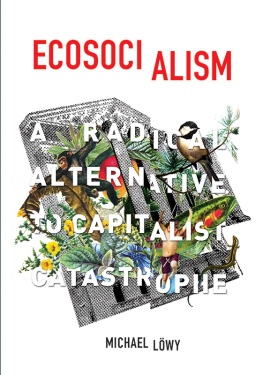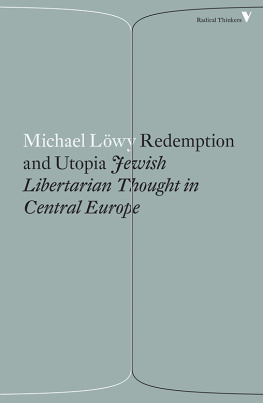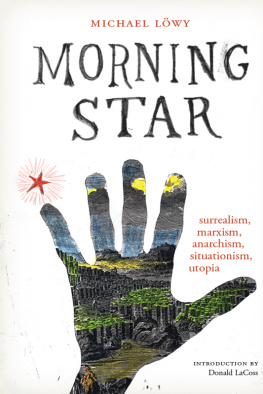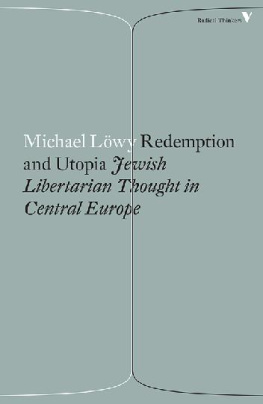Löwy - Ecosocialism: a radical alternative to capitalist catastrophe
Here you can read online Löwy - Ecosocialism: a radical alternative to capitalist catastrophe full text of the book (entire story) in english for free. Download pdf and epub, get meaning, cover and reviews about this ebook. City: Chicago;Illinois, year: 2015, publisher: Haymarket Books, genre: Politics. Description of the work, (preface) as well as reviews are available. Best literature library LitArk.com created for fans of good reading and offers a wide selection of genres:
Romance novel
Science fiction
Adventure
Detective
Science
History
Home and family
Prose
Art
Politics
Computer
Non-fiction
Religion
Business
Children
Humor
Choose a favorite category and find really read worthwhile books. Enjoy immersion in the world of imagination, feel the emotions of the characters or learn something new for yourself, make an fascinating discovery.
Ecosocialism: a radical alternative to capitalist catastrophe: summary, description and annotation
We offer to read an annotation, description, summary or preface (depends on what the author of the book "Ecosocialism: a radical alternative to capitalist catastrophe" wrote himself). If you haven't found the necessary information about the book — write in the comments, we will try to find it.
Löwy: author's other books
Who wrote Ecosocialism: a radical alternative to capitalist catastrophe? Find out the surname, the name of the author of the book and a list of all author's works by series.
Ecosocialism: a radical alternative to capitalist catastrophe — read online for free the complete book (whole text) full work
Below is the text of the book, divided by pages. System saving the place of the last page read, allows you to conveniently read the book "Ecosocialism: a radical alternative to capitalist catastrophe" online for free, without having to search again every time where you left off. Put a bookmark, and you can go to the page where you finished reading at any time.
Font size:
Interval:
Bookmark:
Contents
2015 Michael Lwy
Published in 2015 by
Haymarket Books
P.O. Box 180165
Chicago, IL 60618
773-583-7884
www.haymarketbooks.org
info@haymarketbooks.org
ISBN: 978-1-60846-505-7
Trade distribution:
In the US, Consortium Book Sales and Distribution, www.cbsd.com
In Canada, Publishers Group Canada, www.pgcbooks.ca
In the UK, Turnaround Publisher Services, www.turnaround-psl.com
All other countries, Publishers Group Worldwide, www.pgw.com
This book was published with the generous support of Lannan Foundation and Wallace Action Fund.
Cover design by Christine Knowlton.
Library of Congress Cataloging-in-Publication data is available.
Chapter Two
Ecosocialism and Democratic Planning
If capitalism cant be reformed to subordinate profit to human survival, what alternative is there but to move to some sort of nationally and globally planned economy? Problems like climate change require the visible hand of direct planning.... Our capitalist corporate leaders cant help themselves, have no choice but to systematically make wrong, irrational, and ultimatelygiven the technology they commandglobally suicidal decisions about the economy and the environment. So then, what other choice do we have than to consider a true ecosocialist alternative?
Richard Smith
Ecosocialism is an attempt to provide a radical civilizational alternative to what Marx called capitalisms destructive progress. It advances an economic policy founded on the nonmonetary and extraeconomic criteria of social needs and ecological equilibrium. Grounded on the basic arguments of the ecological movement and of the Marxist critique of political economy, this dialectical synthesisattempted by a broad spectrum of authors, from Andr Gorz (in his early writings) to Elmar Altvater, James OConnor, Joel Kovel, and John Bellamy Fosteris at the same time a critique of market ecology, which does not challenge the capitalist system, and of productivist socialism, which ignores the issue of natural limits.
According to OConnor, the aim of ecological socialism is a new society based on ecological rationality, democratic control, social equality, and the predominance of use value over exchange value.
For ecosocialists, the problem with the main currents of political ecology, represented by most green parties, is that they do not seem to take into account the intrinsic contradiction between the capitalist dynamics of the unlimited expansion of capital and accumulation of profits and the preservation of the environment. This leads to a critique of productivism, which is often relevant but does not lead beyond an ecologically reformed market economy. The result has been that many green parties have become the ecological alibi of center-left social-liberal governments.
On the other hand, the problem with the dominant trends of the left during the twentieth centurysocial democracy and the Soviet-inspired Communist movementis their acceptance of the actually existing pattern of productive forces. While the former limited themselves to a reformedat best Keynesianversion of the capitalist system, the latter developed an authoritarian collectivistor state capitalistform of productivism. In both cases, environmental issues remained out of sight or were at least marginalized.
Marx and Engels themselves were not unaware of the environmentally destructive consequences of the capitalist mode of production; there are several passages in Capital and other writings that point to this understanding. Moreover, they believed that the aim of socialism is not to produce more and more commodities, but to give human beings free time to fully develop their potentialities. To this extent they have little in common with productivism, i.e., with the idea that the unlimited expansion of production is an aim in itself.
However, the passages in their writings to the effect that socialism will permit the development of productive forces beyond the limits imposed on them by the capitalist system imply that socialist transformation concerns only the capitalist relations of production, which have become an obstacle (chains is the term often used) to the free development of the existing productive forces. Socialism would mean above all the social appropriation of these productive capacities, putting them at the service of the workers. To quote a passage from Anti-Dhring , a canonical work for many generations of Marxists, under socialism society takes possession openly and without detours of the productive forces that have become too large for the existing system.
The experience of the Soviet Union illustrates the problems that result from such a collectivist appropriation of the capitalist productive apparatus. From the beginning, the thesis of the socialization of the existing productive forces predominated. It is true that during the first years after the October Revolution an ecological current was able to develop, and the Soviet authorities took certain limited environmental protection measures. But with the process of Stalinist bureaucratization, productivist methods both in industry and agriculture were imposed by totalitarian means while ecologists were marginalized or eliminated. The catastrophe of Chernobyl was the ultimate example of the disastrous consequences of this imitation of Western productive technologies. A change in the forms of property that is not followed by democratic management and a reorganization of the productive system can only lead to a dead end.
A critique of the productivist ideology of progress and of the idea of a socialist exploitation of nature had appeared already in the writings of some dissident Marxists of the 1930s, such as Walter Benjamin. But it is mainly during the last few decades that ecosocialism has developed as a challenge to the thesis of the neutrality of productive forces, which predominated in the main tendencies of the left during the twentieth century.
Ecosocialists should take their inspiration from Marxs remarks on the Paris Commune: Workers cannot take possession of the capitalist state apparatus and put it to work at their service. They have to break it and replace it with a radically different, democratic, and nonstatist form of political power. The same applies, mutatis mutandis, to the productive apparatus, which is not neutral but carries in its structure the imprint of its development at the service of capital accumulation and the unlimited expansion of the market. This puts it in contradiction with the needs of environmental protection and with the health of the population. One must therefore revolutionize it in a process of radical transformation.
Of course many scientific and technological achievements of modernity are precious, but the whole productive system must be transformed, and this can be done only by ecosocialist methods: i.e., through a democratic planning of the economy that takes into account the preservation of the ecological equilibrium. This may mean discontinuing certain branches of production: for instance, nuclear plants, certain methods of mass/industrial fishing (which are responsible for the near-extermination of several species in the seas), the destructive logging of tropical forests, etc.the list is very long. It first of all requires, however, a revolution in the energy system, with the replacement of the present sources (essentially fossil) that are responsible for the pollution and poisoning of the environment with renewable sources of energy: water, wind, sun. The issue of energy is decisive because fossil energy (oil, coal) is responsible for much of the planets pollution as well as for the disastrous climate change. Nuclear energy is a false alternative not only because of the danger of new Chernobyls, but also because nobody knows what to do with the thousands of tons of radioactive wastetoxic for hundreds, thousands, and in some cases millions of yearsand the gigantic carcasses of contaminated obsolete plants. Solar energy, which has never aroused much interest in capitalist societies (not being profitable or competitive), must become the object of intensive research and development and play a key role in the building of an alternative energy system.
Next pageFont size:
Interval:
Bookmark:
Similar books «Ecosocialism: a radical alternative to capitalist catastrophe»
Look at similar books to Ecosocialism: a radical alternative to capitalist catastrophe. We have selected literature similar in name and meaning in the hope of providing readers with more options to find new, interesting, not yet read works.
Discussion, reviews of the book Ecosocialism: a radical alternative to capitalist catastrophe and just readers' own opinions. Leave your comments, write what you think about the work, its meaning or the main characters. Specify what exactly you liked and what you didn't like, and why you think so.












